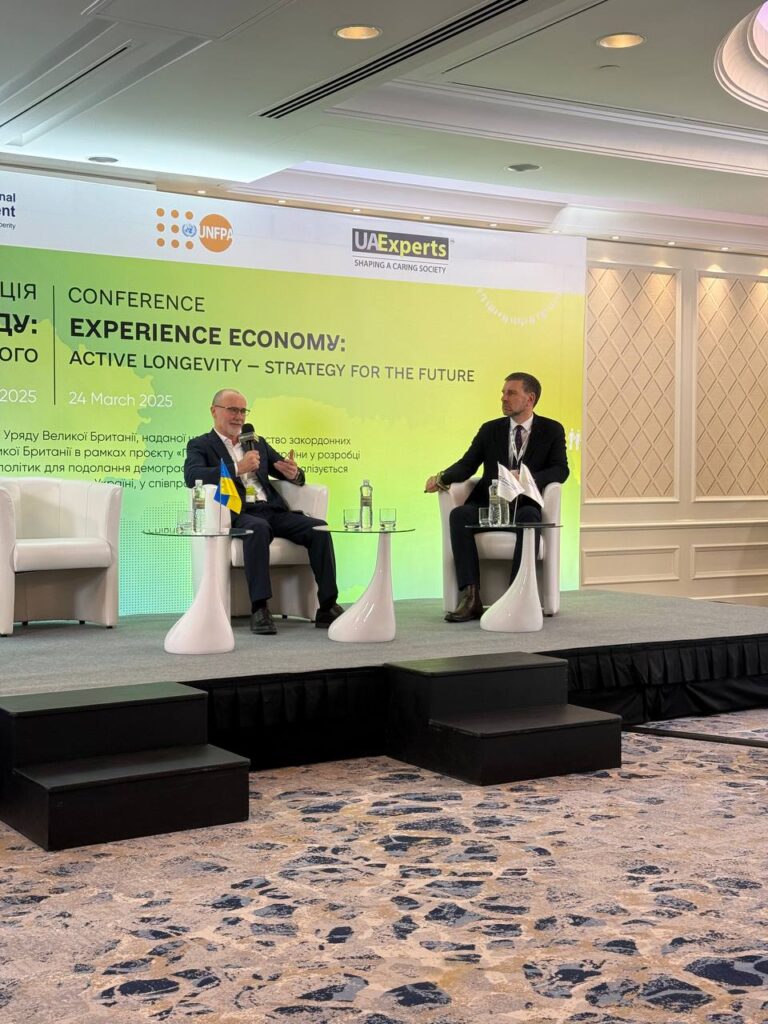
On March 24, at the conference “Economy of Experience: Active Longevity – Strategy for the Future,” organized by the Ministry of Social Policy of Ukraine with the support of UNFPA, the United Nations Population Fund, and the UK Government, business leaders, experts, and the public sector discussed how to turn experience into a competitive advantage and ensure active longevity by effectively engaging older workers in economic life.
According to Oksana Zholnovych, the Minister of Social Policy of Ukraine, the average age of Ukrainians has risen from 41 to 45 over the past three years. Therefore, it is now crucial to rethink the role of older people and create conditions where they can remain economically active, pass on knowledge, and continue to develop.
Astarta has answers to these questions. Viktor Ivanchyk, co-founder and CEO of “Astarta-Kyiv,” shared the company’s experience of engaging older workers.
“Engaging workers aged 60+ is not just a social initiative, but a strategic necessity for both business and the state. They possess professional experience and expertise that reduce training costs, and their employment lessens the social burden on the budget. Since the summer of 2024, the share of such employees at Astarta has increased from 5% to 10%, and this trend is gaining momentum. Clearly, during the country’s post-war reconstruction, this dynamic will only intensify.”
Older workers are a valuable asset for both business and the state. “In the agricultural sector, their experience is irreplaceable: they transfer unique knowledge, serve as mentors for younger professionals, help maintain continuity of processes, and accelerate the adaptation of new staff. At Astarta, we see that the mix of youth and experience produces the best results, and collaboration between generations creates mutual value,” said Viktor Ivanchik.
Astarta applied a systematic approach and initiated the large-scale “Active and Healthy Longevity” project to adapt to these changes. Its goal is to create a trend for active longevity in Ukraine, overcome the labour shortage, engage 60+ professionals in the workforce, and create conditions for the continued professional activity of workers in other age categories, thereby supporting the country’s economy.
“Integrating experienced workers is not only about mentorship or retraining. Businesses must create conditions that promote their effective work: flexible employment formats, automation of routine processes, and support for physical and mental health. At Astarta, we are developing digital technologies so that people can focus on more complex tasks. We are also implementing the ‘Healthy and Unbreakable’ project, which includes medical check-ups, psychological support, and an active lifestyle. By caring for the health and well-being of our employees, we ensure their productivity for years to come,” added Astarta’s CEO.
Viktor Ivanchyk emphasized the importance of scaling active longevity practices in Ukraine and highlighted the need for joint responsibility between business, government, communities, and employees: “In the approach to engaging older workers, the partnership between the state, public institutions, and business is crucial. Especially now when we are facing serious challenges. We must make the most efficient use of our unity during the post-war reconstruction and recovery, turning our uniqueness into future opportunities.”
To make the company’s practical experience more helpful, Astarta is actively participating in national-scale projects: together with the Ministry of Social Policy, it is working on the development of the National Strategy for Active Longevity, and together with the Ministry of Economy, EBRD, and consulting company Korn Ferry, it is participating in a working group to prepare the National Program “Human Capital Resilience”. These are necessary steps for Ukraine to overcome demographic challenges and unlock the potential of older workers.
Ukraine has accumulated a unique experience that can become a strategic export resource. The full-scale war has forced us to quickly adapt, find unconventional solutions, and effectively use limited resources, and this experience is already attracting global interest.
“The true strength of a nation is measured not by how it avoids crises, but by how it overcomes them and what it learns in the process. This quote by Winston Churchill is more relevant than ever for Ukraine. I am confident that we will overcome this crisis and emerge much stronger, wiser, and more effective,” said Viktor Ivanchyk.
